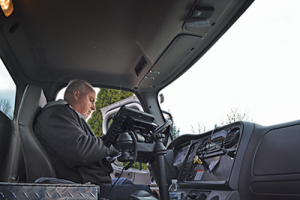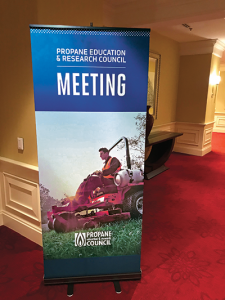Industry events, communication move online

Propane companies are making a shift toward more digital processes during the pandemic. Photo: LP Gas staff
Since mid-March, when COVID-19 began to spread throughout the United States and President Donald Trump instituted a travel ban to and from various countries, the entire world has learned that it can do more remotely – and, in turn, online – than it ever thought possible.
Consumers can order anything from a smartphone app and receive delivery the same or next day. All forms of commerce can be conducted remotely. And people are taking full advantage of the technologies that enable them to do more in less time.
The propane industry is part of this transition, as the coronavirus pandemic has forced it to conduct more operations online and remotely than ever before. This shift online has taken place in several areas, particularly for events and meetings, and interactions between employers and employees.
The following examples and suggestions showcase the ways in which this shift has recently occurred in the propane industry, how employers and employees have reacted, and what the industry can expect to transpire in the future.
Virtual events and meetings
In June 2019, Bill Stomp, president and founder of digitalsoftwareservices.co and tankspotter.com, began to research the potential for an online propane industry trade show and purchased online domain names.
At the time, Stomp wanted to serve the industry by helping all propane marketers attend a national expo, in spite of their busy schedules.
So he developed virtualpropaneexpo.com, an online trade show in which propane marketers and vendors can connect and transact easily while also enjoying the benefits of a national propane trade show from the comfort of their homes. Available 24/7 year-round, the online trade show offers propane marketers and vendors an alternative after the coronavirus pandemic forced the cancellation of the National Propane Gas Association’s (NPGA) Southeastern Convention & International Propane Expo in April.

PERC postponed its Can-Do Conference until 2021, and has hosted online meetings and webinars. The council says it intends to host more virtual meetings in conjunction with in-person events. Photo: LP Gas staff
Since then, more than 200 exhibitors have registered and built out virtual trade show booths, which are filled with company information, including explainer and product summary videos.
“As the industry’s demand continues to rise, we plan to further expand [the virtual expo],” Stomp says. “In doing so, we’ll be fully prepared to serve associations, marketers, presenters and vendors, and help them flourish during their continuous shift to online and remote operations.”
In the meantime, the Propane Education & Research Council (PERC) has postponed its large marketing event, the Can-Do Conference, until next year so that propane professionals can focus their attention on (and dedicate their resources to) their states as the country continues to reopen. Its other meetings have been held virtually. PERC intends to continue to host more virtual meetings in conjunction with in-person meetings.
Additionally, PERC and NPGA have created a series of webinars to offer propane professionals information about legislative and regulatory activity, along with safety advice, related to COVID-19’s impact on operations.
“The propane industry was presented with a huge challenge, but everybody has rallied together to figure out a way to help the industry move forward,” says Bridget Kidd, senior vice president of industry relations at PERC. “The sheer will of the industry has been demonstrated the last few months.”
Avoid communication roadblocks
Without question, there are roadblocks to effective remote, online communication.
When employees are in their offices, they can ask co-workers or managers questions “in the moment.” But during the COVID-19 remote work, that in-person interaction is completely gone and, with it, any body language or voice inflection, according to Aimee Allen, founder of Degree Days Consulting.
“Add to it the phenomena that takes place by virtue of being ‘away,’ in that it just feels like you can’t get an immediate answer,” she stresses. “What’s happening is that emails or text messages are being sent, which may not be clear or concise, or multiple messages are being sent about the same subject matter. This then creates inefficiencies and confusion between employers and employees.”
To solve these issues, Allen advises propane employers to train their staff members (and themselves) on how to be effective communicators in this increasingly digital and remote world. No experts for the training are necessary. Neither is in-person training. Instead, Allen suggests that employers utilize the training offerings from local and national organizations.
“Knowledge is power. You have to first identify where the ineffective communications are in your organization,” she adds. “Then, work with those people to let them know their options to build those skill sets.
“If they don’t know they’re doing anything incorrectly (and how that’s impacting business), they’re less likely to personally invest in training and gain anything from it,” she continues. “It’s an investment that’s not only worthwhile for internal communications, but externally – with your customers – as well.”
Keep communication lines open
When it comes to remote work, shifting to digital only and maintaining lines of communication from a distance, Allen believes employees should embrace the fact that it’s OK not to have all of the answers. To keep lines of communication open in this new era, Allen recommends owners and operators become more intentional about check-in meetings with their employees.
“Don’t focus only on the task or the job needing to be done. Although they’re critical to day-to-day operations, in these times, I encourage you to go deeper,” Allen says.
Instead, owners and operators should check in on their employees to see how they’re doing emotionally and physically, she adds. Ask them what you can do to help them. Be authentic as you ask them how they are doing.
Aside from one-on-one meetings with employees, owners and operators can also encourage team meetings with one another or as a group in a virtual setting. Group chats, which aren’t necessarily focused on work, can also be created.
“The propane industry is unique. Often, employees are like their own family within work,” Allen says. “So, encourage engagement and interaction above and beyond work.”
She also believes leaders have the responsibility to be engaged with their employees during the shift to digital and remote work, as they should create examples of how to interact with others. On the other hand, employees should own their roles and places in remote work too. They should never feel isolated, nor should they wait for managers to reach out to them.
“Employees should consider a weekly recap that they create to send to their bosses at the end of the week, which summarizes major work deliverables, customer service interactions, needs and challenges, and perhaps big wins,” she says. “Or, at the beginning of the week, employees can send their bosses notifications that outline what they have planned for the week, along with their intended schedules.”
A silver lining
Kidd believes there’s been a silver lining for employer and employee interactions as a result of COVID-19. In particular, she’s heard propane owners and operators mention that the virus has led them to look at their own electronic communication policies and procedures, and better prepare for other emergencies in the future.
Furthermore, PERC is noticing a rise in online training, as the propane industry is rising to the occasion to ensure employees’ needs and interests are being met. And the dedication to customer service – and to successful employer and employee interactions – is continuing throughout the country, even in the midst of a pandemic that’s led to a shift in workplace culture.
“Individual companies are showcasing their unique abilities to creatively address their various situations – remote work, digital communications only and so forth – to provide outstanding service in a challenging time,” Kidd explains.
“To me, the last few months have demonstrated the roots of the propane industry, which are so based in family and community,” she adds. “And they’ve shown thousands of propane professionals’ commitments to customer service, which they always have.”
















